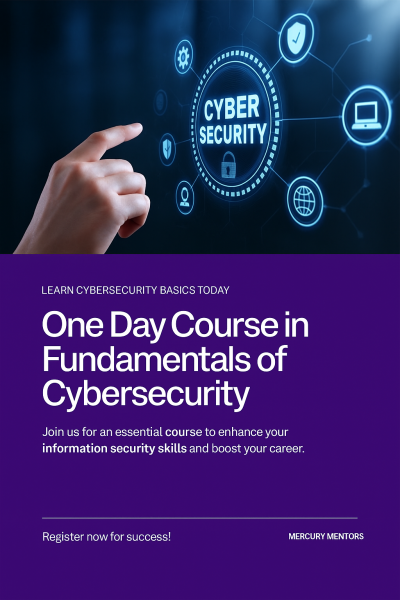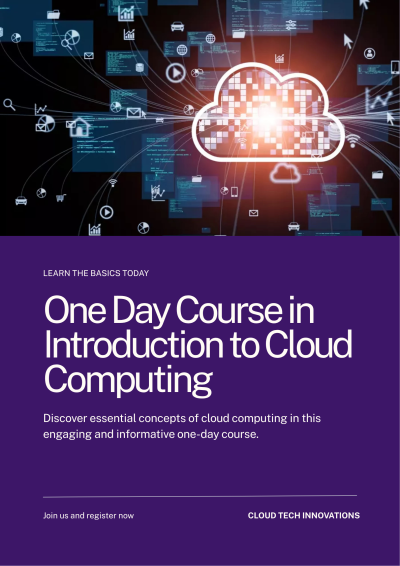Course description
Mercury Mentors is dedicated to helping students build their careers by offering affordable, high-quality courses designed to equip them with essential skills and knowledge. By providing access to expert instructors and a focused curriculum at a low cost, Mercury Mentors ensures that students can enhance their employability without financial burden. The platform fosters a supportive learning environment, enabling students to network with peers and industry professionals, gain practical insights, and develop competencies that are highly valued in the job market. This commitment to accessible education empowers students to take significant steps toward achieving their career goals.
Fundamentals of Cybersecurity
The Fundamentals of Cybersecurity course is designed to provide participants with a solid foundation in the core concepts, techniques, and tools used to protect digital assets and information systems. In today’s world, where cyber threats are increasingly sophisticated and frequent, understanding cybersecurity is essential for individuals and organizations alike. This course equips learners with the knowledge and skills necessary to identify, mitigate, and prevent common cyber threats, making it ideal for beginners and professionals seeking a strong introduction to the field.
What You’ll Learn:
1. Introduction to Cybersecurity
- Gain an overview of cybersecurity and its importance in today’s digital world.
- Understand the key principles of confidentiality, integrity, and availability (CIA triad) in cybersecurity.
2. Types of Cyber Threats
- Explore various types of cyber threats, including malware, viruses, ransomware, phishing attacks, hacking, and insider threats.
- Learn how cyber criminals target individuals and organizations, and the techniques they use to exploit vulnerabilities.
3. Network Security
- Understand the basics of network security, including firewalls, encryption, and secure communication protocols.
- Learn how to protect networks from unauthorized access, attacks, and data breaches.
4. Data Protection and Privacy
- Explore techniques for protecting sensitive data, including encryption, secure storage, and data classification.
- Learn about data privacy regulations such as GDPR, and how they impact businesses and individuals.
5. Authentication and Access Control
- Understand the importance of strong authentication methods, including passwords, multi-factor authentication (MFA), and biometrics.
- Learn how access control mechanisms such as role-based access control (RBAC) protect sensitive information and systems.
6. Risk Management and Incident Response
- Learn about risk management frameworks and how to assess and mitigate cybersecurity risks.
- Explore incident response planning, and how to effectively respond to cybersecurity breaches and threats.
7. Cybersecurity Best Practices
- Learn key practices for improving cybersecurity, including regular software updates, strong password policies, and employee training.
- Understand the importance of security awareness in preventing human error, one of the most common causes of cyber breaches.
8. Introduction to Ethical Hacking
- Get an introduction to ethical hacking and penetration testing, including how cybersecurity professionals use these methods to identify and fix vulnerabilities.
- Explore basic tools and techniques used in ethical hacking.
9. Cybersecurity Tools and Technologies
- Introduction to essential cybersecurity tools such as antivirus software, intrusion detection systems (IDS), and virtual private networks (VPNs).
- Learn how these tools are used to detect, prevent, and respond to cyber threats.
10. Regulatory and Legal Aspects
- Explore the legal and regulatory aspects of cybersecurity, including compliance with national and international standards.
- Learn about the role of law enforcement in investigating cybercrime and protecting critical infrastructure.
Course Format
This course combines theoretical knowledge with practical applications, ensuring that participants gain both an understanding of cybersecurity concepts and hands-on experience with key tools and techniques. Through interactive lectures, case studies, and practical exercises, participants will gain insight into real-world cybersecurity challenges and how to address them.
Who Should Attend
- Beginners This course is perfect for individuals with little to no background in cybersecurity who want to build a strong foundation.
- IT Professionals: Ideal for IT staff who want to enhance their knowledge of cybersecurity to protect organizational networks and data.
- Business Owners and Managers For those looking to safeguard their businesses from cyber threats and ensure compliance with data protection regulations.
- Students and Career Changers Suitable for individuals interested in pursuing a career in cybersecurity.
Benefits of the Course:
- Comprehensive Understanding Gain a solid grasp of the core principles and best practices in cybersecurity.
- Hands-On Learning: Practical exercises and case studies to apply theoretical knowledge in real-world scenarios.
- Career Advancement Build a strong foundation to pursue further certifications or a career in cybersecurity.
- Up-to-Date Knowledge Learn about the latest trends, tools, and regulations in the ever-evolving field of cybersecurity.
Course Outcomes:
By the end of the Fundamentals of Cybersecurity course, participants will have a clear understanding of the threats facing digital systems and how to protect against them. You will be equipped with the knowledge needed to assess cybersecurity risks, implement security measures, and develop incident response strategies. Whether for personal use or as a stepping stone to a career in cybersecurity, this course offers essential insights into protecting the digital world.
Why Enroll?
Networking Opportunities: Connect with industry professionals and peers.
Resource Materials: Access exclusive readings and materials.
Certificate of Completion: Enhance your resume with a recognized credential.
Q&A Session: Engage directly with experienced practitioners.
FollowUp Support: Discover further learning and career opportunities in the field.
7. Get access 650+ HR's email ID's hiring


















